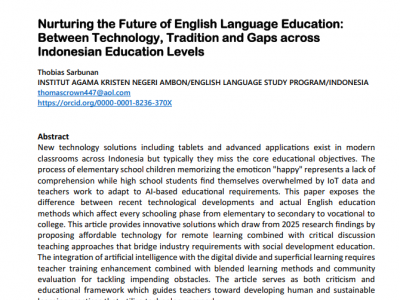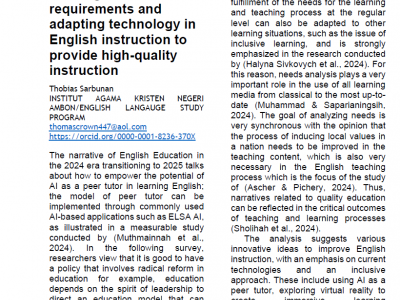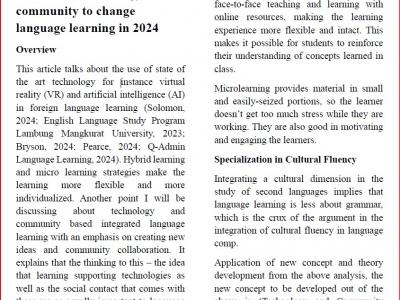Datasets
Standard Dataset
The AI Revolution in English Language Learning: New Developments, Difficulties, and Consequences for EFL Education's Sustainability
- Citation Author(s):
- Submitted by:
- Thobias Sarbunan
- Last updated:
- Tue, 01/14/2025 - 23:11
- DOI:
- 10.21227/3phs-nv20
- Data Format:
- License:
 210 Views
210 Views- Categories:
- Keywords:
Abstract
AI was begun to increasingly part of EFL education introducing novelties, issues and opportunities. Current studies explore many possibilities, such as employing federated learning as a protection of data privacy and the implementation of ChatGPT in multilingual learning. This article offers comprehensive analysis of how AI could transform pedagogy, improve writing skills and motivate students through evaluating the novelty, existing voids, need, and implications of many the most promising studies. The results of this study suggest a need to involve scholars, educators, and technology developers in practicing collaboration which aims to integrate the benefits and drawbacks of language instruction into to pursue a more inclusive and flexible approach to the discipline’s future. Using artificial intelligence (AI) in English as a foreign language (EFL) is a promising field of investigation in recent years. Today’s studies offer ideas on how to integrate new technologies into learning, show different forms of novelty, void, necessity, and consequences. These four areas suggest that a better appreciation of AI’s possibilities and a more sophisticated approach to its role by teachers, academics and linguists can help them unlock much of its potential to promote the successful learning of a second language.
The study plan focusing on the role of AI on EFL instruction will pay attention on designing and evaluating infuse AI instructional approaches that would improve the instructional practice to address the current challenges. The effectiveness of collaborative education dimensions in protecting data privacy, AI literacy impact on learning design, Generative AI in improving academic writing skills and students’ motivation will be explored in this blended methods research.
The project will also include the survey of instructors’ attitudes toward AI, their training requirements in connection with AI, as well as artificially intelligent dialog agents within the context of the multilingual learning and business interpretation case studies utilizing questionnaires. As for research gaps which include the lack of information on the impacts of AI on learners’ learning outcomes and lack of practical guidelines for the use of AI in EFL education, this study aims at developing a sustainable framework for using AI in EFL instruction.
The results from this study are expected to provide policy recommendations and ideal instructional networks in addition to being a foundation for further adaptive and inclusive innovation.
Dataset Files
- DOC ZIP The AI Revolution in English Language Learning.zip (188.51 kB)
- TXT DOC The AI Revolution in English Language Learning.txt (15.12 kB)










